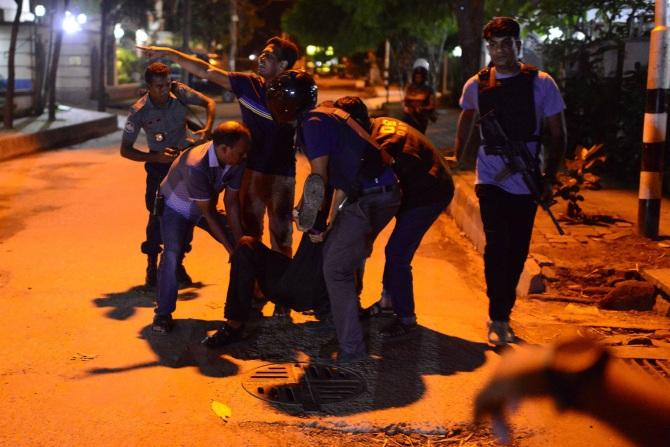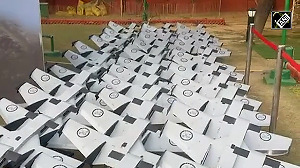'If a bloodbath of this nature can occur in a high security area like Gulshan, I shudder to think how vulnerable other parts of this country are,' Bangladesh activist Dr Lelin Choudhury tells Rediff.com's Indrani Roy

"The Bangladesh government has to take immediate steps to counter terrorism. Bloodshed has to stop. People of this country have every right to live," medical practitioner and human rights activist Lelin Choudhury told Rediff.com's Indrani Roy the over telephone from Dhaka.
Like many other social and political activists in Bangladesh, Dr Choudhury believes the Holey Artisan Bakery attack on Friday evening was not masterminded by Islamic State operatives, but by some local fanatic Islamist groups.
According to the Western media, Islamic State terrorists carried out the gruesome killings at the Holey Artisan Bakery.
A few Western countries, especially the US, is desperate to prove the existence of IS in Bangladesh.
The moment the attack on the Holey Artisan Bakery took place, IS' involvement hit the headlines in some sections of the media.
Why?
If America can prove that there is IS -- or for that matter Al Qaeda -- in Bangladesh, it can garner support among South Asian countries for its consistent fight against these two terror groups.
Also, it will provide America an opportunity under the pretext of friendship to interfere in the politics and economy of Bangladesh.
(Pauses) There is a saying in Bangladesh -- if you have a friend like America, you don't need enemies.
How are you so sure that some local forces are responsible for the carnage?
The pattern of the attack as has been reported in the media indicates that.
First, the terrorists were carrying unsophisticated weapons -- some crude bombs, three pistols, one rifle and a few improvised explosive devices.
IS is known to use more sophisticated arms.
Moreover, the photos released by the police to the media revealed that all the attackers were Bangladeshis whom the police were looking for some time.
They were known to be war criminals' sympathisers (Editor's note: War cirminals refers to those who collaborated with the Pakistan army in the atrocities in then East Pakistan in 1971. Many 'war criminals' have been found guilty by Bangladesh courts and executed.).
We hear that there was some kind of negotiation between the Bangladesh police and the attackers before the terrorists killed 20 hostages.
Yes.
Unconfirmed reports suggest that in the early hours of the hostage crisis, the terrorists had raised the following demands with the police:
- Freedom for Khaled Saifullah;
- Safe passage for him out of Bangladesh;
- An official statement declaring him a member of the group that is spearheading the Islamist movement in Bangladesh.
Saifullah, arrested by the police a few days ago, allegedly planned a machete attack on Madaripur college teacher Ripon Chakrawarty.
This clearly suggests a link between Saifullah and the eatery assailants.
Are you happy with the army operation and the role of the police?
Yes. I think the Bangladesh government has been extremely efficient and prompt in dealing with the crisis.
Initially, when the police were at work, they were not well prepared to counter the terrorists, which is why two officers got killed.
However, with the army launching Operation Thunderbolt, the situation was brought under control in no time.
Of late, bloggers, writers, publishers, activists and priests have been hacked to death in Bangladesh. Who, do you think, are behind these killings?
A group of Islamic fundamentalists who want to challenge the country's secularism carry out these murders.
Their sole motive is to initiate a communal riot.
They have been unsuccessful so far, thanks to the positive vibes of the common people.
Islamist forces have been active in Bangladesh in recent years. What is the reason?
Islamist forces have existed in Bangladesh for decades.
When the common people of this country launched the Shahbag Movement (external link) in February 2013, those forces, including some notorious members of the Jamaat-e-Islami party, were in for a rude shock.
According to media reports, they started gathering steam through a series of clandestine meetings.
If you look at the records, you will find that the rate of killing of minorities by these Islamist groups too went up in this country post 2013.
Has the Opposition Bangladesh Nationalist Party supported these Islamists?
Oh yes!
BNP has always supported them to gain political mileage.
But now things have gone out of control and the BNP too has lost its hold over these divisive forces.
Yes. I am worried stiff.
All the more so because the episode exposes the futility of security measures that exist in this country.
If a bloodbath of this nature can occur in a high security area like Gulshan, I shudder to think how vulnerable other parts of this country would be.
What has been the effect of this attack on the common people?
Yesterday (July 2), I visited some market places in Dhaka and was shocked to find them almost empty.
Id-ul-Fitr is just round the corner, yet there is no enthusiasm among the people.
There were very few cars on the streets too.
It is quite clear that the Gulshan killings have left a deep scar on Bangladeshis' minds.
What does Sheikh Hasina's government need to do now?
It has to identify the Islamist terror modules that operate in this country.
It has failed to nab the suspicious organisations that fund these terror outfits.
It is high time the government took action against them and brought the offenders to book.
The people of Bangladesh are seething with discontent over this government's failure to curb terrorism.
The government has to launch a massive manhunt at the earliest.
It just cannot afford to be indifferent to the issue any longer.
Will the Gulshan attack have any impact on India-Bangladesh ties?
Though a section of the media and some groups with vested interests are desperately trying to sour the bilateral relationship, the governments of both countries are keen on maintaining the warmth and camaraderie.
Common people on both sides of the border too are eager to stand together in their consolidated fight against terrorism.
Before the elections, BNP leader Begum Khaleda Zia had said, 'If the Awami League (Prime Minister Sheikh Hasima's party) wins, people won't be allowed to perform namaz in mosques.'
But despite this threat, people voted the Awami League to power.
I have great confidence in the power that lies with the people -- it is strong enough to counter terrorism of every kind.










